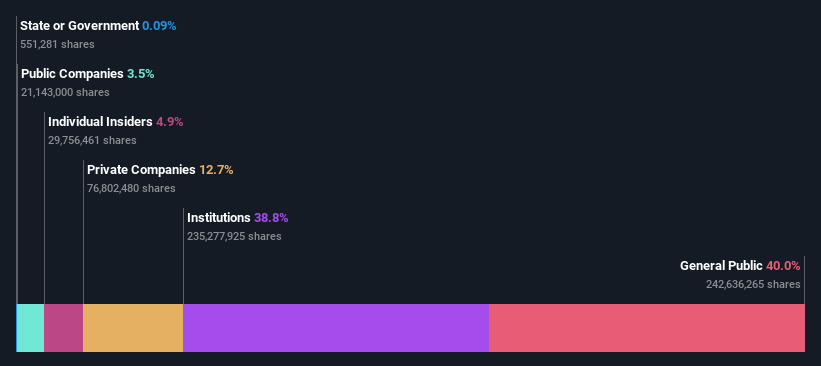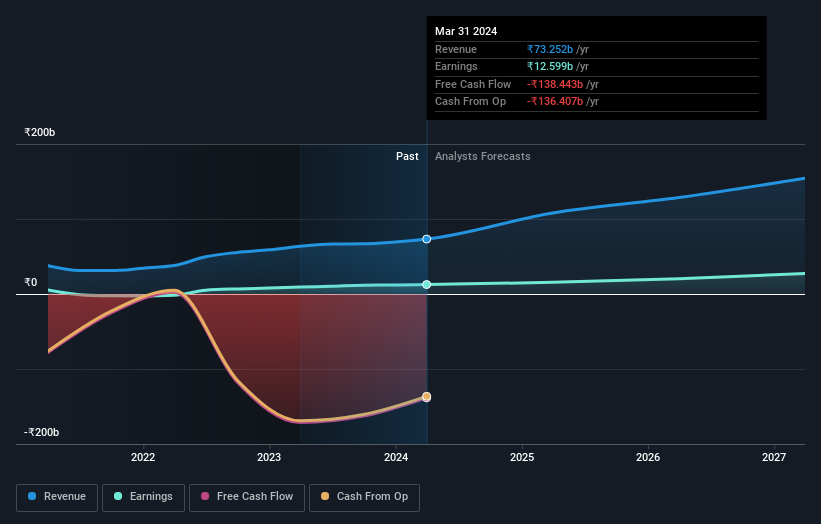RBL Bank Limited's (NSE:RBLBANK) market cap dropped ₹5.3b last week; individual investors who hold 40% were hit as were institutions

Key Insights
- RBL Bank's significant retail investors ownership suggests that the key decisions are influenced by shareholders from the larger public
- A total of 23 investors have a majority stake in the company with 50% ownership
- Institutional ownership in RBL Bank is 39%
A look at the shareholders of RBL Bank Limited (NSE:RBLBANK) can tell us which group is most powerful. And the group that holds the biggest piece of the pie are retail investors with 40% ownership. In other words, the group stands to gain the most (or lose the most) from their investment into the company.
While institutions who own 39% came under pressure after market cap dropped to ₹149b last week,retail investors took the most losses.
Let's delve deeper into each type of owner of RBL Bank, beginning with the chart below.
Check out our latest analysis for RBL Bank

What Does The Institutional Ownership Tell Us About RBL Bank?
Institutional investors commonly compare their own returns to the returns of a commonly followed index. So they generally do consider buying larger companies that are included in the relevant benchmark index.
RBL Bank already has institutions on the share registry. Indeed, they own a respectable stake in the company. This can indicate that the company has a certain degree of credibility in the investment community. However, it is best to be wary of relying on the supposed validation that comes with institutional investors. They too, get it wrong sometimes. When multiple institutions own a stock, there's always a risk that they are in a 'crowded trade'. When such a trade goes wrong, multiple parties may compete to sell stock fast. This risk is higher in a company without a history of growth. You can see RBL Bank's historic earnings and revenue below, but keep in mind there's always more to the story.

Hedge funds don't have many shares in RBL Bank. Looking at our data, we can see that the largest shareholder is Maple II B.V. with 7.9% of shares outstanding. In comparison, the second and third largest shareholders hold about 4.7% and 3.8% of the stock.
After doing some more digging, we found that the top 23 have the combined ownership of 50% in the company, suggesting that no single shareholder has significant control over the company.
Researching institutional ownership is a good way to gauge and filter a stock's expected performance. The same can be achieved by studying analyst sentiments. There are plenty of analysts covering the stock, so it might be worth seeing what they are forecasting, too.
Insider Ownership Of RBL Bank
The definition of an insider can differ slightly between different countries, but members of the board of directors always count. Company management run the business, but the CEO will answer to the board, even if he or she is a member of it.
Insider ownership is positive when it signals leadership are thinking like the true owners of the company. However, high insider ownership can also give immense power to a small group within the company. This can be negative in some circumstances.
Our most recent data indicates that insiders own some shares in RBL Bank Limited. This is a big company, so it is good to see this level of alignment. Insiders own ₹7.3b worth of shares (at current prices). Most would say this shows alignment of interests between shareholders and the board. Still, it might be worth checking if those insiders have been selling.
General Public Ownership
The general public-- including retail investors -- own 40% stake in the company, and hence can't easily be ignored. While this size of ownership may not be enough to sway a policy decision in their favour, they can still make a collective impact on company policies.
Private Company Ownership
Our data indicates that Private Companies hold 13%, of the company's shares. It might be worth looking deeper into this. If related parties, such as insiders, have an interest in one of these private companies, that should be disclosed in the annual report. Private companies may also have a strategic interest in the company.
Public Company Ownership
Public companies currently own 3.5% of RBL Bank stock. We can't be certain but it is quite possible this is a strategic stake. The businesses may be similar, or work together.
Next Steps:
While it is well worth considering the different groups that own a company, there are other factors that are even more important. Case in point: We've spotted 1 warning sign for RBL Bank you should be aware of.
If you would prefer discover what analysts are predicting in terms of future growth, do not miss this free report on analyst forecasts.
NB: Figures in this article are calculated using data from the last twelve months, which refer to the 12-month period ending on the last date of the month the financial statement is dated. This may not be consistent with full year annual report figures.
New: AI Stock Screener & Alerts
Our new AI Stock Screener scans the market every day to uncover opportunities.
• Dividend Powerhouses (3%+ Yield)
• Undervalued Small Caps with Insider Buying
• High growth Tech and AI Companies
Or build your own from over 50 metrics.
Have feedback on this article? Concerned about the content? Get in touch with us directly. Alternatively, email editorial-team (at) simplywallst.com.
This article by Simply Wall St is general in nature. We provide commentary based on historical data and analyst forecasts only using an unbiased methodology and our articles are not intended to be financial advice. It does not constitute a recommendation to buy or sell any stock, and does not take account of your objectives, or your financial situation. We aim to bring you long-term focused analysis driven by fundamental data. Note that our analysis may not factor in the latest price-sensitive company announcements or qualitative material. Simply Wall St has no position in any stocks mentioned.
About NSEI:RBLBANK
Reasonable growth potential with adequate balance sheet.
Similar Companies
Market Insights
Community Narratives




